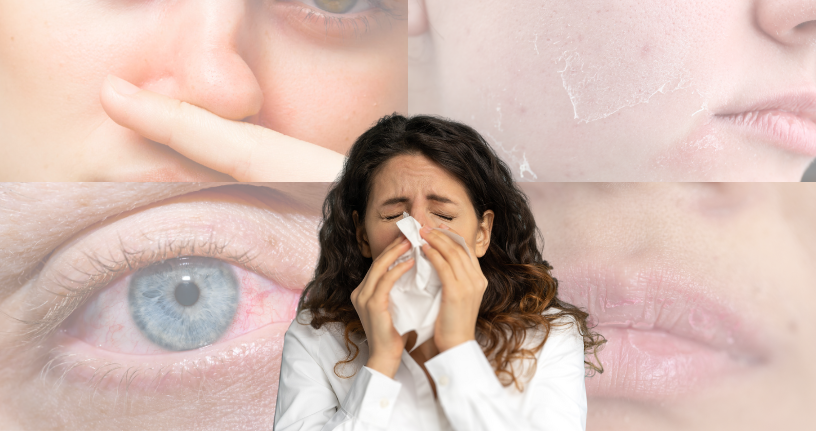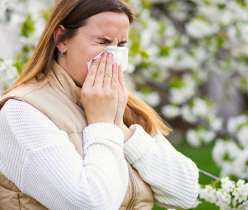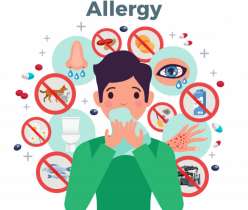Winter isn’t typically considered allergy season, but for many people, winter allergies can be just as bothersome as those in spring or fall. The cold air, indoor heating, and certain allergens can trigger allergic reactions. Allergies to cold weather can greatly disrupt our routine, ultimately leading to stress. If you are among those who are allergic to cold weather, then this page is for you.
Winter allergy symptoms may vary from person to person, but in common, the ones that affect most individuals are cold and cough.
Furthermore, the allergy symptoms during the winter are similar to those experienced during other seasons. These may include sneezing, runny or stuffy nose, itchy or watery eyes, cough, wheezing or shortness of breath, and skin rashes (eczema).
Know about winter allergies and tips for relief. The common winter allergens or allergies during winter are mainly caused by the following:
-
- Indoor mold
Mold grows in damp areas like basements, bathrooms, and kitchens, and it can thrive in the winter months, especially with high humidity. Poor ventilation and cold, wet conditions promote mold growth. - Dust mites
Dust mites live in warm environments commonly found in bedding, carpets, and upholstered furniture. The lack of ventilation in the winter can make these allergens more concentrated indoors. - Pet sander
Pets tend to spend more time indoors during the winter, which means that pet dander (tiny flakes of skin shed by animals) can build up inside your home. This can trigger allergic reactions in sensitive individuals. - Cockroaches
In some areas, cockroaches are a year-round problem. Their presence indoors during the colder months can contribute to allergic reactions. - Pollen (from trees and plants)
While tree pollen isn’t as prevalent in winter as in spring, certain trees can release pollen in early winter. This is especially common in mild climates or areas where the winter is not as harsh. - Indoor air pollution
Indoor pollutants like tobacco smoke, fumes from stoves or fireplaces, and chemical fumes from cleaning products or candles can aggravate allergies and respiratory conditions.
- Indoor mold
How to find relief from winter allergies?
Certain steps can offer great relief from winter allergies; find some of them below:
- Keep indoor air clean
-
- Use an air purifier with a HEPA filter to reduce airborne allergens like dust and pet dander.
-
- Use a dehumidifier to reduce moisture in the air, making it harder for mold to thrive.
-
- Change your furnace filter regularly to avoid circulating dust and other allergens.
- Control dust mites
-
- Wash bedding, pillows, and curtains in hot water once a week.
-
- Use allergen-proof covers on pillows and mattresses.
-
- Vacuum carpets and rugs frequently and consider using a vacuum with a HEPA filter
- Keep pets clean and well-groomed
-
- Bathe pets regularly to reduce dander buildup.
-
- Limit pets to certain areas of the house, such as one room or the outdoors
- Limit exposure to mold
-
- Fix leaks in the roof, pipes, or windows to prevent moisture buildup.
-
- Use mold-resistant paint in bathrooms and other damp areas.
-
- Regularly clean and dry areas prone to mold growth
- Reduce exposure to smoke and fumes
-
- Avoid using tobacco products indoors.
-
- Be mindful of indoor heating methods like wood-burning stoves or fireplaces, which can release particles that aggravate allergies.
-
- Consider using non-toxic, natural cleaning products to reduce indoor pollution
- Medication and allergy shots
-
- Over-the-counter antihistamines, decongestants, or nasal sprays can relieve allergy symptoms.
-
- If symptoms are severe or persistent, consult a doctor about prescription medications or allergy shots (immunotherapy), which can help reduce sensitivity to allergens over time
- Humidity control
-
- Using a humidifier, maintain optimal humidity levels (between 30-50%) in your home. This can help reduce the growth of dust mites and mold and ease respiratory symptoms
- Clean air vents and ducts
-
- Ensure your heating system is properly maintained, and air ducts and vents are cleaned to avoid circulating dust and allergens.
Drinks to treat winter allergy
Certain drinks can help treat winter allergies naturally; some effective options include green tea, peppermint tea, chamomile tea, Tulsi (holy basil) tea, ginger tea, and gram flour (besan) milk. etc. Don’t take a chance if you are allergic to any of the drinks mentioned
When to see a doctor?
If your allergy symptoms persist or worsen despite taking preventive measures, it is recommended to see a doctor. A healthcare professional can perform allergy tests to identify specific triggers and recommend appropriate treatment options, such as prescription medications or immunotherapy. Follow the prescription anti-allergic drugs/medicine course to relieve allergy symptoms
Conclusion
Allergies in the winter are common and can be triggered by various indoor allergens. You can minimize your symptoms by taking steps to manage your environment, such as cleaning, reducing moisture, and controlling pets. If necessary, medications or professional treatments can offer relief, helping you enjoy a comfortable winter season.




